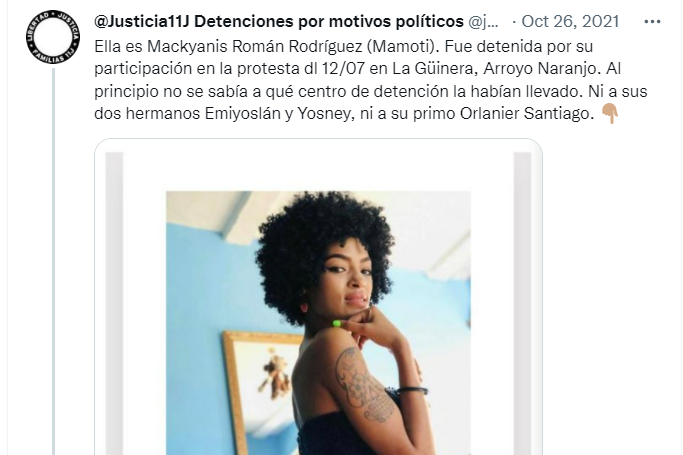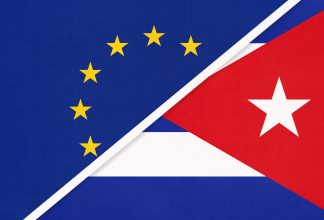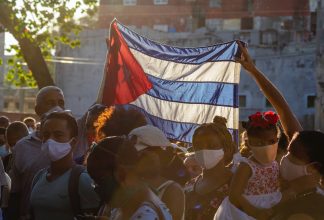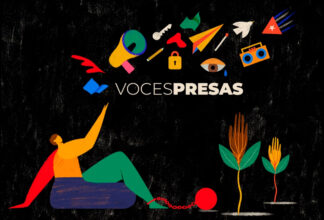Cuban Courts Attack Marginalized Communities – “The EU Needs to Act Decisively”

Just before Christmas a municipal court sentenced 17 protesters from the marginalized neighbourhood La Güinera to between 15 and 25 years in prison.
“The government targets people in La Güinera because people there have very little to lose and are likely to get up and protest tomorrow again. The dictatorship needs to scale up its repression to prevent that from happening,” says Havana-based journalist Maria Matienzo.
Since the 11 July nationwide protests in Cuba, at least 256 protesters have been taken to court. Most of them have received long prison terms. The authorities have particularly attacked the protesters in the marginalised Havana neighbourhood of La Güinera.
News outlet 14ymedio reported about a trial against 15 protesters from La Güinera, held mid-December. The prosecutor asks for 12 to 30 years in prison. In another trial shortly after, a municipal court sentenced 17 protesters from La Güinera to between 15 and 25 years in prison. According to people present in court, interviewed by the independent news outlet Cubanet, very little evidence was presented apart from mobile phone recordings made by the defendants themselves, filming the protests.
Whole Families Detained
The Havana-based independent journalist Maria Matienzo has been following the cases against the protesters since July. She believes it is a deliberate tactic from the government to target La Güinera to intimidate poor people and prevent them from protesting again. Maria Matienzo says the police acted with particular cruelty in La Güinera and that demonstrators were detained early in the mornings by police entering their houses with dogs.
“Whole families were taken to prison. One example are the siblings Mackyanis, Emiyoslán and Yosney Román Rodríguez, and their cousin Orlanier Santiago. They have not been taken to court yet, but the prosecutor asks for 25 years in jail for Mackyanis”, says Maria Matienzo.

Darcy Barrero, a US-based journalist and activist in the Justicia 11J group that together with Cubalex have documented more than 1300 detentions, says that one reason for the very harsh repression in the neighborhood was that the protests took place on 12 July, the day after the main national protests. The security forces were prepared and cracked down on every sign of uprising. In La Güinera, one of the protesters was even shot in the back by the police and died.
According to Darcy Borrero, who grew up in La Güinera, the detainees are not previously known activists.
“Citizens there have limited education and civic awareness, and there is no strong civil society. That makes it easier for the government to lock them up without anything happening. But maybe they didn’t count with the work by organisations as 11J Justicia, and that we have put faces and names to hundreds of prisoners from the protests,” says Darcy Borrero.
The activist groups 11J Justicia and Cubalex, have stated that the authorities detained at least 1339 individuals during the protests on 11 July and the weeks after. 710 of them are still detained, awaiting trial.
Response from the Outside World
The EU has not yet reacted to these latest prison sentences. However, Josep Borrell, the EU high representative on foreign affairs, stated in a speech to the European Parliament in December that the EU has demanded the liberation of all arbitrarily detained protesters in Cuba since July and that human rights are an essential part of the EU-Cuba Political Dialogue and Cooperation Agreement.
“The sentences of the protesters from La Güinera clearly show that the Cuban authorities do not care about the human rights clauses in the Agreement with the EU. It is now the time for the EU to clearly state that Cuba is violating the agreement, and describe what consequences this will have for the cooperation between the EU and Cuba”, says Erik Jennische, Director Latin America Department at Civil Rights Defenders.
“If Cuba can continue to violate the human rights of its citizens on this scale without the EU acting decisively, it will undermine the EU’s international credibility as a promoter of human rights for a long time to come,” says Erik Jennische.


